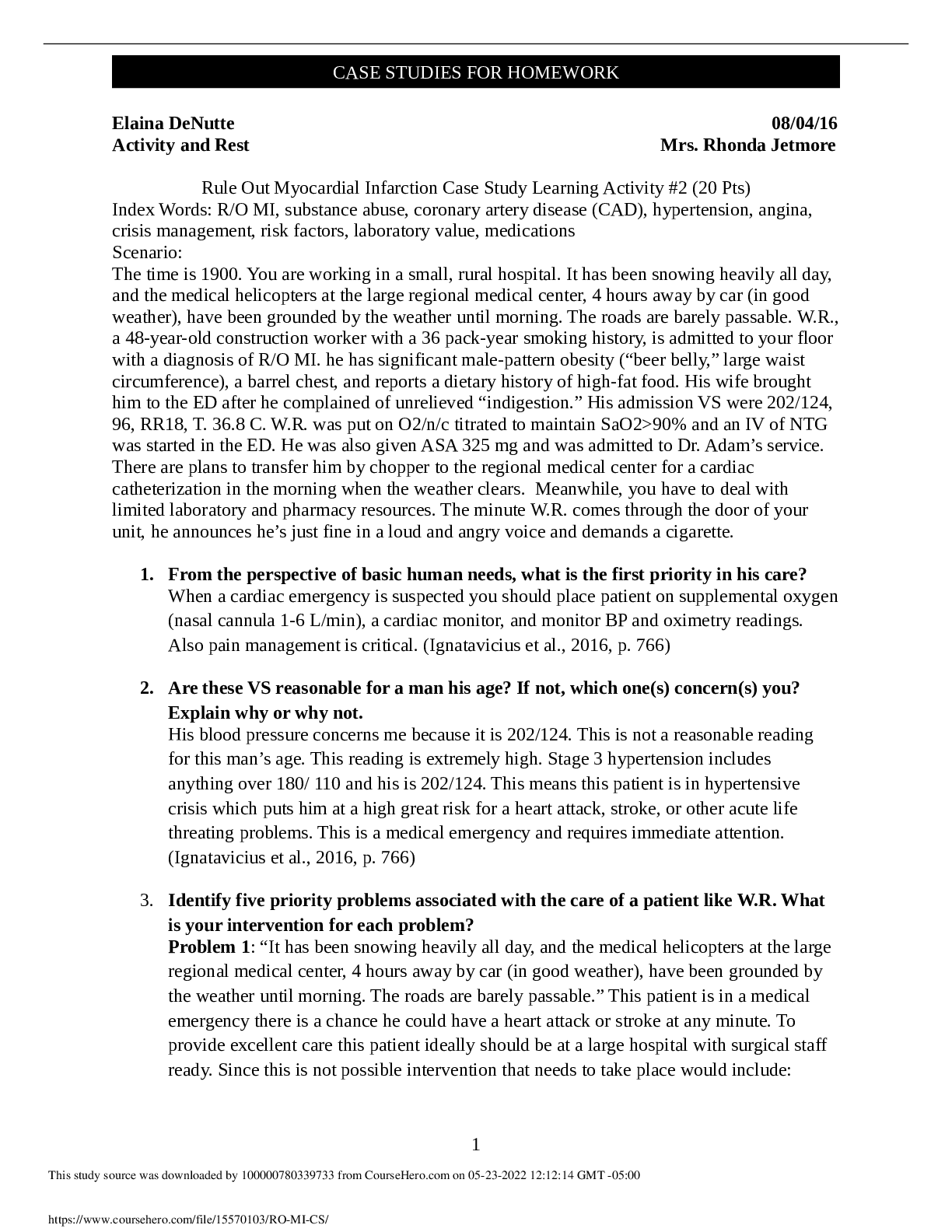Rule Out Myocardial Infarction Case Study Learning Activity #2 (20 Pts)
Index Words: R/O MI, substance abuse, coronary artery disease (CAD), hypertension, angina,
crisis management, risk factors, laboratory value, medications
Scenario:
The time is 1900. You are working in a small, rural hospital. It has been snowing heavily all day,
and the medical helicopters at the large regional medical center, 4 hours away by car (in good
weather), have been grounded by the weather until morning. The roads are barely passable. W.R.,
a 48-year-old construction worker with a 36 pack-year smoking history, is admitted to your floor
with a diagnosis of R/O MI. he has significant male-pattern obesity (“beer belly,” large waist
circumference), a barrel chest, and reports a dietary history of high-fat food. His wife brought
him to the ED after he complained of unrelieved “indigestion.” His admission VS were 202/124,
96, RR18, T. 36.8 C. W.R. was put on O2/n/c titrated to maintain SaO2>90% and an IV of NTG
was started in the ED. He was also given ASA 325 mg and was admitted to Dr. Adam’s service.
There are plans to transfer him by chopper to the regional medical center for a cardiac
catheterization in the morning when the weather clears. Meanwhile, you have to deal with
limited laboratory and pharmacy resources. The minute W.R. comes through the door of your
unit, he announces he’s just fine in a loud and angry voice and demands a cigarette.
1.From the perspective of basic human needs, what is the first priority in his care?
When a cardiac emergency is suspected you should place patient on supplemental oxygen
(nasal cannula 1-6 L/min), a cardiac monitor, and monitor BP and oximetry readings.
Also pain management is critical. (Ignatavicius et al., 2016, p. 766)
2.Are these VS reasonable for a man his age? If not, which one(s) concern(s) you?
Explain why or why not.
His blood pressure concerns me because it is 202/124. This is not a reasonable reading
for this man’s age. This reading is extremely high. Stage 3 hypertension includes
anything over 180/ 110 and his is 202/124. This means this patient is in hypertensive
crisis which puts him at a high great risk for a heart attack, stroke, or other acute life
threating problems. This is a medical emergency and requires immediate attention.
(Ignatavicius et al., 2016, p. 766)
3.Identify five priority problems associated with the care of a patient like W.R. What
is your intervention for each problem?
Problem 1: “It has been snowing heavily all day, and the medical helicopters at the large
regional medical center, 4 hours away by car (in good weather), have been grounded by
the weather until morning. The roads are barely passable.” This patient is in a medical
emergency there is a chance he could have a heart attack or stroke at any minute. To
provide excellent care this patient ideally should be at a large hospital with surgical staff
ready. Since this is not possible intervention that needs to take place would include:
Read More
.png)

